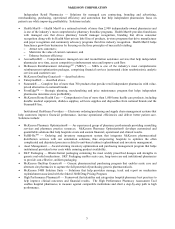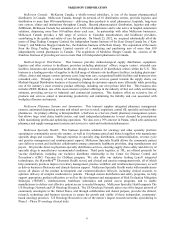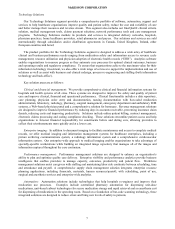McKesson 2012 Annual Report Download - page 19
Download and view the complete annual report
Please find page 19 of the 2012 McKesson annual report below. You can navigate through the pages in the report by either clicking on the pages listed below, or by using the keyword search tool below to find specific information within the annual report.McKESSON CORPORATION
15
Health Care Reform: The Affordable Care Act significantly expanded health insurance coverage to uninsured
Americans and changed the way health care is financed by both governmental and private payers. Although the
U.S. Supreme Court is considering whether to strike down some or all of the Act’s provisions, further federal and
state proposals for healthcare reform are likely. We do not currently anticipate that the Affordable Care Act or any
resulting federal and state healthcare reforms will have a material impact on our business, financial condition and
results of operations. However, given the scope of the changes made and under consideration, as well as the
uncertainties associated with implementation of healthcare reforms, we cannot predict their full effect on the
Company at this time.
Interoperability Standards: There is increasing demand among customers, industry groups and government
authorities that healthcare software and systems provided by various vendors be compatible with each other. This
need for interoperability is leading to the development of standards by various groups, and certain federal and state
agencies are also developing standards that could become mandatory for systems purchased by these agencies. For
example, the HITECH Act requires meaningful use of “certified” healthcare information technology products by
healthcare providers in order to receive stimulus funds from the federal government. Effective September 27, 2010,
CMS issued a rule that utilizes a staged approach for defining meaningful use criteria. Under the staged approach,
CMS has issued rules that identify the initial criteria for meaningful use and is updating these initial criteria with
additional rules. In addition, these standards are subject to interpretation by the entities designed to certify such
technology. A combination of our solutions has been certified as meeting the initial criteria. However, we may incur
increased development costs and delays in upgrading our customer software and systems to be in compliance with
these varying and evolving standards. In addition, these new standards may lengthen our sales and implementation
cycle and we may incur costs in periods prior to the corresponding recognition of revenue. To the extent these
standards are narrowly construed or delayed in publication, or that we are delayed in achieving certification under
these evolving standards for applicable products, our customers may postpone or cancel their decisions to purchase
or implement our software and systems.
FDA Regulation of Medical Software. The FDA has increasingly focused on the regulation of medical
software, computer products and computer-assisted products as medical devices under the federal Food, Drug and
Cosmetic Act. For example, effective April 18, 2011, the FDA issued a new rule regulating certain computer data
systems as medical devices. If the FDA chooses to regulate any of our products as medical devices, it can impose
extensive requirements upon us. If we fail to comply with the applicable requirements, the FDA could respond by
imposing fines, injunctions or civil penalties, requiring recalls or product corrections, suspending production,
refusing to grant pre-market clearance of products, withdrawing clearances and initiating criminal prosecution.
Additionally, beginning in calendar 2013, the Affordable Care Act provides that a tax in an amount equal to 2.3
percent of the price for which the manufacturer sells its medical devices will have to be paid by each medical device
manufacturer. Since we sell medical devices, we may be impacted by this tax. Any additional FDA regulations
governing computer products, once issued, may increase the cost and time to market new or existing products or
may prevent us from marketing our products.
Standards for Submission of Health Care Claims: HHS has adopted two new rules that impact healthcare
claims submitted for reimbursement. The first rule modifies the standards for electronic health care transactions
(e.g., eligibility, claims submission and payment and electronic remittance) from Version 4010/4010A to Version
5010. The enforcement deadline for the 5010 rule has been extended through June 30, 2012. The second rule
updated and expanded the standard medical code sets for diagnosis and procedure coding from International
Classification of Diseases, Ninth Revision (“ICD-9”) to International Classification of Diseases, Tenth Revision
(“ICD-10”). HHS has postponed the compliance date for ICD-10 conversion, previously October 1, 2013, for an
unspecified period. Updating systems to Version 5010 is required for use of the ICD-10 code set. Generally, claims
submitted not using Version 5010 and ICD-10 when required will not be processed, and health plans not accepting
transactions using Version 5010 and ICD-10 may experience significant increases in customer service inquiries. We
may incur increased development costs and delays in delivering solutions and upgrading our software and systems
to be in compliance with these new standards. In addition, these standards may lengthen our sales and
implementation cycle and we may incur costs in periods prior to the corresponding recognition of revenue. Delays
in providing software and systems that are in compliance with the new standards may result in postponement or
cancellation of our customers’ decisions to purchase our software and systems.
























